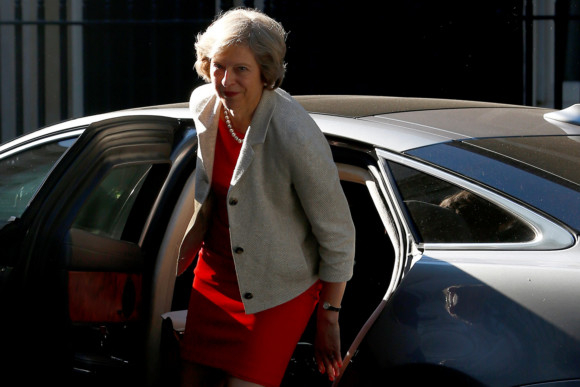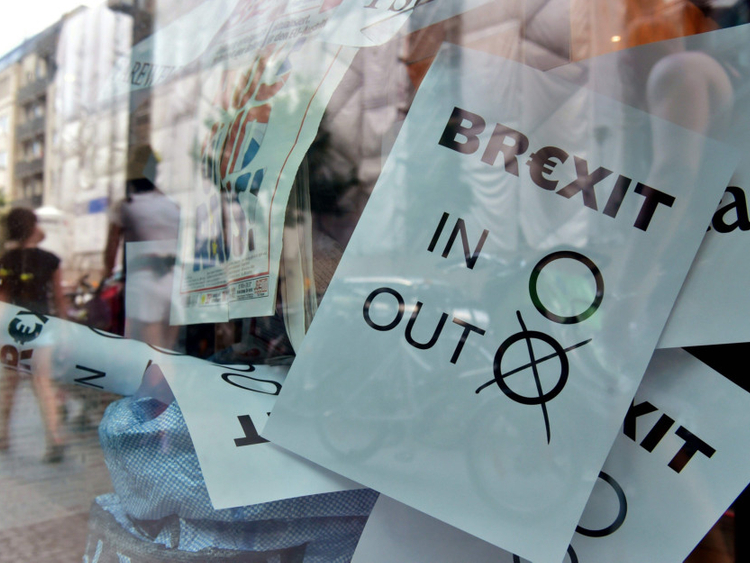
On Monday, members of Britain’s House of Commons backed renewing the Trident nuclear deterrent by an overwhelming 472-117 majority. British Prime Minister Theresa May said she would not hesitate to press the nuclear button if she felt it was necessary. May’s astonishingly thorough remodelling of the cabinet — quite unlike David Cameron’s very occasional shake-ups — will need to be bedded in and stress tested.
A week ago Theresa May was still home secretary — a great office of state, to which she was astonished to be appointed in 2010. As her arrival in Downing Street filled our screens, I was reminded of the Tory grandee who told me during the coalition years: “Theresa is a jolly nice girl with a terrific team. But she’ll never be leader. Not a chance.” I wonder what he is thinking now.
May, for her part, exploited lazy chauvinism of this sort to position herself perfectly for this moment, whenever it came. Sooner or later, the boys in tails and fancy waistcoats who ran the country would turn on one another, and when they did she would be ready to step in. Cameron spotted what she was up to. When pressed on his potential successors, he consistently named George Osborne, Boris Johnson — and Theresa May. In the event, she was the only one of the gilded trio who ran for the job.
As a contender, May’s most important insight reflected the context of her candidacy: after the referendum result and the consequent political upheaval, she could not be the candidate for continuity Cameronism. There is much in his legacy that is worth preserving, notably the ambitions for social reform that were always obscured by the work of economic repair. But May’s task has been to mark, ruthlessly, a moment of change, to usher in a season of radical transformation.
It helps that she and her predecessor have such different personalities: Cameron was always warmly feudal while May, though perfectly pleasant, is unswervingly businesslike. Though Cameron never allowed his team’s deliberations to slip into “sofa government”, I expect May to adopt a more formal approach.
In principle the new regime wants to decentralise more power to departments and prevent the long reach of Downing Street and the Cabinet Office becoming a de facto West Wing — a constitutionally noble objective that may not survive the slings and arrows of crisis. Not being Dave meant building a completely new cabinet, sending a message to party, media and public that the new premier did not feel remotely constrained by her predecessor.
Michael Gove would be an asset to any department, and is simply too talented to have reached the end of the road. But Team May could not envisage him sitting at the cabinet table near to Boris Johnson, the victim of his supposed “treachery”, and took what chancellors call “a difficult decision”.
Rational, yet risky move
On the subject of chancellors, the sudden exile of George Osborne has been seriously misrepresented. Between December 2005 and last week the Conservative party was controlled by a duumvirate, an alliance as close as the Blair-Brown rivalry was bitter and destructive. For six years all meaningful power in the nation state flowed from the Cameron-Osborne axis.
So the new team took a decision as rational as it was risky: to purge the duo in full, and not just its Cameronian wing. The gossip that Osborne is seething in a bunker, egged on by his supporters, is wide of the mark. After six years as the architect of austerity, cutting and cutting and cutting — never enough to please the right, and always too much for fiscal nimbys (who were all for savings, until their own departmental backyards were affected) — he is at last released from this cycle.
At least twice a year Osborne made statements about the public finances that invariably promised more pain and more parsimony. Throughout his ministerial career, he has been the electorate’s pi-ata. I am reliably informed that, released from this role, he is “demob happy” and not consumed by resentment. In time, that warm glow will fade.
But for now, Team May has nothing to worry about. Four weeks ago I suggested in my column that David Davis should be put in charge of Brexit negotiations. As a civil libertarian — the most prominent ofthe Runnymede Tories — he was not an obvious pick for the former home secretary. But his appointment is one of the most imaginative of the entire reshuffle, along with the choice of Damian Green, an admirably consistent practitioner of compassionate conservatism who will bring a serious grasp of policy detail as well as authentic one-nation credentials to bear on his new job as work and pensions secretary.
Neurotic relationship with gender
Having established that she is not Cameron’s twin sister, May must also persuade the world that she is not Thatcher’s lost daughter. Freud would have had a field day examining the Tory party’s neurotic relationship with gender, and its collective reverence for the first female prime minister — a reverence that has nothing to do with feminism.
Those Tories — politicians and pundits — who long for May to revive the glory years of 1979-90 are talking nonsense. It is no more logical for May to set her compass by the ideology of a predecessor who left office 26 years ago than it would have been for Thatcher to model herself on the Churchill of 1953.
It is beyond obvious that May’s principal challenge will be the implementation of Brexit, and the extent to which she is able to reconcile the two most powerful forces of 21st century globalisation: the drive for economic growth and unprecedented population mobility.
She is constrained by a small majority. The assault course ahead is forbidding. What makes her intriguing is the radicalism she promised from Downing Street last Wednesday. To govern for the disadvantaged and the disenfranchised, for the families that are “just managing”, for those who do not share the presumptions of “the fortunate few”. If this is more than rhetoric, it represents the beginning of a transformative premiership. If she means what she says, Brexit will be no more than the backdrop to something much more turbulent, disruptive and welcome.
— Guardian News & Media Ltd
Matthew d’Ancona is a visiting research fellow at Queen Mary University of London, author of several books including In It Together: The Inside Story of the Coalition, and chairman of the think-tank Bright Blue.










